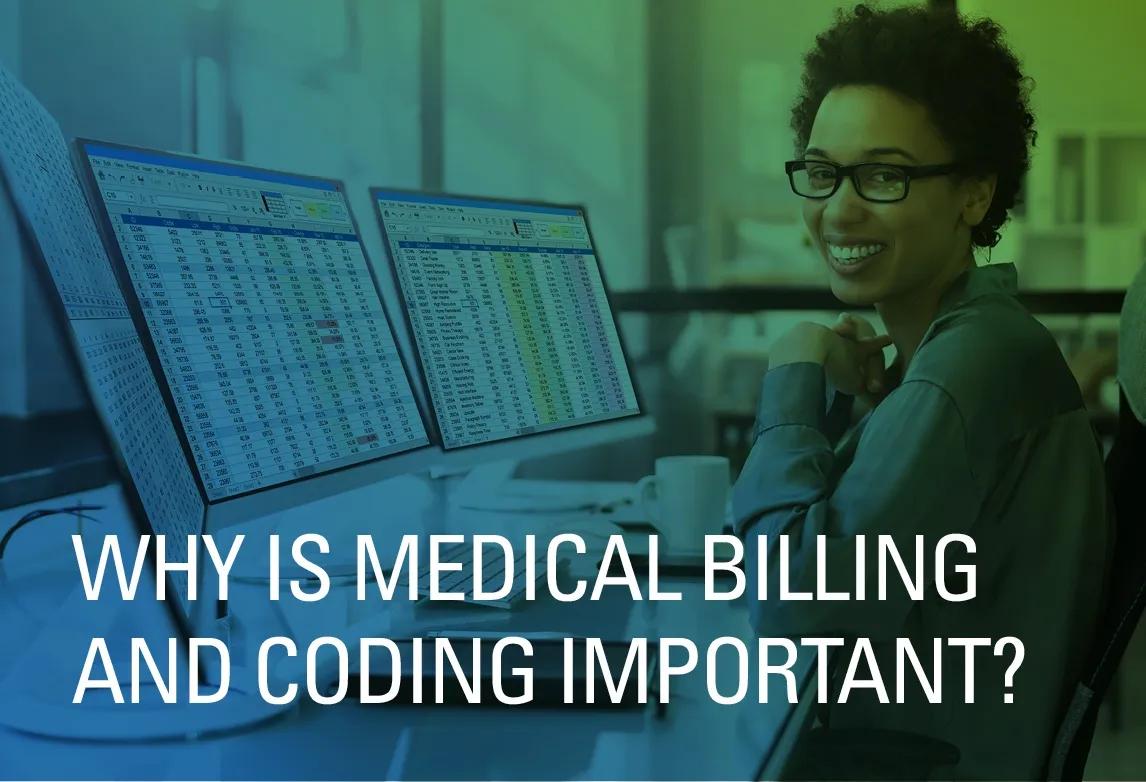Table of contents
Why Is Medical Billing and Coding Important?

Table of Contents
- Why Is Medical Billing and Coding Important?
- The Critical Role of Medical Billing and Coding in Healthcare
- Why Is Entering the Correct Codes Important for Patient Billing?
- Why Are Medical Billing Coding Guidelines Important?
- A Growing Need for Medical Billing and Coding Specialists
- The Medical Billing and Coding Career Path
- Pursue Your Medical Billing and Coding Career Today
- FAQs
Many jobs within the healthcare field are important. Doctors, nurses, pharmacists, and physical therapists all work to increase our health and wellness. Another position to add to this list is medical billers and coders. What makes medical billing and coding so critical to the healthcare system?
Why Is Medical Billing and Coding Important?
Think about the paperwork involved with just one doctor’s office visit or medical procedure. You may not realize it, but there is even more involved than what you see.
Whenever you or someone you know visits a clinic, needs emergency medical care, or has a planned surgery, it creates paperwork and documentation that must be meticulously processed and tracked.
The information that must be properly documented includes the type of procedure conducted and the amount and type of supplies that were used. These are the details your insurance provider and medical facilities need to determine payment for the medical procedure. This is handled by a medical biller and coder.
The Critical Role of Medical Billing and Coding in Healthcare
Medical billers and coders act as a liaison between healthcare providers and insurance companies. They spend their days translating patients’ complex medical records into an easy-to-understand language that the insurance carriers require to process claims.
It’s like how a computer requires programming to run your favorite applications. These programs are created by computer programmers or coders. They enable the computer to communicate with the various programs behind the scenes, resulting in the text, graphics, and images you see on the monitor’s screen.
Medical billers and coders serve this same purpose in a healthcare setting. They input the code that allows healthcare providers to effectively communicate with insurance companies.
Why Is Entering the Correct Codes Important for Patient Billing?
One reason that it’s important to use the correct codes for patient billing is that insurance companies use these number and letter sequences to determine whether the procedure or service is covered under the patient’s insurance policy. If this code isn’t put into the system correctly, payment to the healthcare provider may be denied or delayed. Too many delays create an ineffective and slow-to-respond healthcare system.
Additionally, the codes used tell the insurance company what portion of the expense their responsibility and which portion of the expense belongs to the patient. If the code is incorrect, the insurance carrier could deny the claim, putting more of the financial burden on the patient.
Even though every medical procedure is different in its complexity and scope, any medical service provided is going to create paperwork and information that must be processed properly by a medical billing and coding specialist. It doesn’t matter if it’s a small procedure at a local clinic or a complicated surgery in a large hospital, a professional is needed to keep data, details, and important documentation flowing between the facility and insurance providers. That person is a medical billing and coding professional.
Why Are Medical Billing Coding Guidelines Important?
Working as a medical biller and coder requires that you follow basic coding guidelines. These serve as a sort of best practices guide for each coding system.
For instance, there is a set of guidelines provided for ICD-10 codes. ICD stands for International Classification of Diseases and the 10 signifies the 10th revision. The Centers for Medicare and Medicaid Services and the National Center for Health Statistics have worked together to create a set of guidelines for this system of codes.
Examples of current ICD-10 guidelines include:
- Using a 3-character code only if it is not subdivided
- Not assigning symptoms routinely associated with a disease an additional code
- Reporting symptom codes if a definitive diagnosis has not been established
Other common medical billing and coding systems, such as the CPT (Current Procedural Terminology) coding system, has its own best practice guidelines.
The CPC certification exam includes seven questions that test your knowledge of the various coding guidelines. So, it is important to familiarize yourself with these guidelines before taking this test.
A Growing Need for Medical Billing and Coding Specialists
As our population continues to age and the healthcare industry grows to meet rising needs, so does the number of medical billing and coding specialists employed in the field. Medical billing and coding is how those in the healthcare field keep track of the data and paperwork involved with medical procedures and keep information flowing efficiently between medical service providers and insurance companies.
The Bureau of Labor Statistics (BLS) adds that medical billers and coders also serve a critical need for healthcare agencies as most of their records are electronic. Additionally, specialized healthcare providers are expected to need this service in the years ahead even more due to the aging population.
The Medical Billing and Coding Career Path
If you are looking for a career path that is stable and growing, the BLS predicts that medical billing and coding will be in demand in the years ahead as cited by an anticipated 9% growth rate.
Those who pursue a medical billing and coding education may start careers in outpatient clinics, doctors’ offices, dental practices, or anywhere else patient and procedure information is documented and processed. Because medical billing and coding skills are often transferable (coding systems are standardized for ease of communication between organizations), expertise in the field may open job opportunities throughout the United States.
An educational program in medical billing and coding can be completed in as little as 18 months depending on the student. Programs are available online and in the classroom.
Pursue Your Medical Billing and Coding Career Today
If you’re ready to begin working as a medical biller and coder, Ultimate Medical Academy offers both a diploma and a degree program in medical billing and coding. The diploma program can be completed in as little as 11 months and you can earn your associate degree in medical billing and coding in approximately 18 months.1
Both programs are offered online and teach diagnostic and procedural coding. Both also offer an introduction to computers and healthcare communication, as well as introducing you to medical terminology, medical law and ethics, and anatomy and physiology.
Contact us today to learn how you can get started, whether you qualify for financial aid, and more. And if you’re not sure whether medical billing and coding is the right career for you, we can also discuss some of our other healthcare program options.
FAQs
What is the purpose of medical coding?
The purpose of medical coding is to convert patient records into a code that is “readable” by the insurance company so it knows how much it must reimburse the healthcare provider for services rendered.
What are the reasons and importance of coding diagnoses?
Coding diagnoses is important because it tells the insurance carrier what portion of the expense is theirs and what portion the patient is responsible for paying. The diagnosis code also supports a healthcare service as being medically necessary, which may be required according to the insurance policy.
Why are coders important?
Health insurance companies require a claim to be filed before it will reimburse a healthcare provider. Instead of listing the names of each disease, illness, procedure, or treatment on each claim, each one is assigned a code. Medical coders are required to convert these diagnoses and procedures into code so they can be read.
Why are coding guidelines so important?
Coding guidelines are important because they serve as best practices for each of the coding systems used in medical billing and coding. Following these guidelines ensures that each medical biller and coder is inputting codes in the same way.
1 Completion times may vary depending on the individual student.
Request Information
Talk with us. Start your journey.
Complete this form and we'll call you to explore options at UMA and answer your questions. We'll also email you info on how to get started. We're with you at every step!
Request Information
Talk with us. Start your journey.
Complete this form and we'll call you to explore options at UMA and answer your questions. We'll also email you info on how to get started. We're with you at every step!
About the Author
 Adam Fenster
Adam FensterAdam Fenster is a senior copywriter at Ultimate Medical Academy, with journalism experience from his time as a reporter and editor for multiple online and print publications. Adam has been covering healthcare education since 2019, with an emphasis on topics such as wellness, healthcare employment, and job preparedness. He received his BA in journalism from the University of South Florida.
Related Content

Phlebotomy Technician: Education, Training, and Certification
Read More
